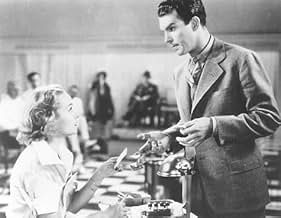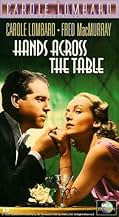IMDb-BEWERTUNG
6,9/10
2231
IHRE BEWERTUNG
Füge eine Handlung in deiner Sprache hinzuA loafer and a manicurist, both planning to marry money, meet and form an uneasy alliance.A loafer and a manicurist, both planning to marry money, meet and form an uneasy alliance.A loafer and a manicurist, both planning to marry money, meet and form an uneasy alliance.
- Auszeichnungen
- 3 wins total
Peter Allen
- Jewelry Clerk
- (Nicht genannt)
Murray Alper
- Cabbie
- (Nicht genannt)
Sam Ash
- Maitre d'Hotel
- (Nicht genannt)
Herman Bing
- Barber
- (Nicht genannt)
Ralph Brooks
- Restaurant Patron
- (Nicht genannt)
Sterling Campbell
- Barber
- (Nicht genannt)
Whitey the Cat
- Cat
- (Nicht genannt)
Albert Conti
- Maitre d' in Speakeasy
- (Nicht genannt)
Marcelle Corday
- Celeste
- (Nicht genannt)
Nell Craig
- Saleswoman
- (Nicht genannt)
William Demarest
- Natty
- (Nicht genannt)
Empfohlene Bewertungen
"Hands Across the Table" serves as a great showcase for the comedy talents of Carole Lombard. She and Fred MacMurray work well together. This was their first of 4 teamings. There's a funny bit by William Demarest and great support from Ruth Donnelly and especially Marie Prevost as Lombard's pal Nona. All in all, a light, funny and enjoyable film.
Cynical gold-digger Regi Allen (Carole Lombard) is a hotel manicurist. She befriends rich hotel guest Allen Macklyn (Ralph Bellamy). He's wheelchair bound and she doesn't consider him as marriage material. She does get a manicure appointment from weirdo Theodore Drew III (Fred MacMurray). Everybody assumes that he comes from money.
I actually thought that Allen would be the romantic lead, but he disappears during all of the middle. It actually doesn't make sense that Regi wouldn't go after him if she's a true gold-digger. Fred MacMurray is pretty fun. He's doing his wacky personality and is a good pairing with Carole Lombard. I do keep holding out for Allen until he shows up in the third act. He distracted me from fully enjoying this rom-com.
I actually thought that Allen would be the romantic lead, but he disappears during all of the middle. It actually doesn't make sense that Regi wouldn't go after him if she's a true gold-digger. Fred MacMurray is pretty fun. He's doing his wacky personality and is a good pairing with Carole Lombard. I do keep holding out for Allen until he shows up in the third act. He distracted me from fully enjoying this rom-com.
"Hands Across the Table" is a sparkling and enjoyable screwball romance, directed with an airy grace by the underrated Paramount stylist Mitchell Leisen, whose "Easy Living"(1937) and "Swing High, Swing Low"(1937) are two of the greatest classics of the 1930s. "Hands" is a minor work to be sure, but it is enjoyable and worthwhile for showcasing the comedic talents of Carole Lombard as the gold-digging manicurist who falls for a former millionaire playboy, played by Fred MacMurray. Ralph Bellamy plays Lombard's rejected suitor, a role that somehow prefigures his role in Hawks' "His Girl Friday".
Carole Lombard was a woman ahead of her time. She was no dumb blonde. She was a brilliant, beautiful, and talented actress in comedy or drama. In this film, she plays a New York City manicurist who believes the key to happiness is marrying a man with money. She becomes a regular manicurist to wheelchair bound Ralph Bellamy in a charming performance and courted by Fred McMurray's character, Theodore Drew III, who is unfortunately engaged to a wealthy pineapple heiress. After missing his cruise ship to Bermuda, Drew stays with Lombard's Regi Allen character in her apartment. There they have their share of laughs and moments to bring them together. Anyway, you can't help but root for them or hope for Regi's future. The cast is first rate with Carole Lombard, Fred McMurray, Ralph Bellamy, and Ruth Donnelly. Astrid Allwyn is fine as Vivian Snowden. The film is entertaining too at times.
Carole Lombard was one of Hollywood's finest comediennes; she worked best when she was backed by an equally strong male lead in this case, it's Fred MacMurray, with whom she must have clicked because they appeared together three more times (two of these films, THE PRINCESS COMES ACROSS [1936] and TRUE CONFESSION [1937], are also included in Universal's 2-Disc Lombard collection and I should get to them in the next couple of days).
The comic style of the film falls somewhere between sophisticated and screwball: lavish settings and stuffy aristocratic characters are mingled with the often zany working-class (keeping their chin up during the Depression but, in Lombard's case, harboring a desire to marry into money); the title refers to her job as a manicurist. Typically for this type of film, when she sets her eyes on a gentleman of title who's young and handsome to boot (MacMurray) he turns out to be engaged to an even wealthier lady (Astrid Allwyn), because he's himself penniless! Running after her (the term is put lightly here, since he's actually wheelchair-bound) is an ex-air ace played by the actor who cornered the market around this time in "Other Man" roles, Ralph Bellamy, who's naturally got a lot of money and thinks of Lombard as a perfect match but his love goes unrequited.
The mixture includes slapstick, wisecracks, romance, drama and even a bit of sentimentality (Lombard spends a good part of the last act sobbing). Still, as always in these more innocent times (where, for instance, a woman has to turn around when the man she's living with albeit platonically, for the moment is about to wear his pants!), none of the characters are really unsympathetic so that we don't even despise the jilted lovers, who are understanding enough to know when to give up. The ending of the film is a classic: Lombard and MacMurray cause a traffic jam to look for a missing penny on which they've staked the course of their future! Appearing in one scene as a prospective boyfriend of Lombard's (whom MacMurray scares away) is future Preston Sturges regular William Demarest.
The film was shown in the early 1990s on late-night Italian TV in its original language with forced Italian subtitles, but I had missed it (the same thing is true for the afore-mentioned THE PRINCESS COMES ACROSS and MacMurray's other film with Leisen TAKE A LETTER, DARLING [1942]); I did, however, acquire some of the director's other great work this way most of which is, regrettably, still unavailable on DVD...
The comic style of the film falls somewhere between sophisticated and screwball: lavish settings and stuffy aristocratic characters are mingled with the often zany working-class (keeping their chin up during the Depression but, in Lombard's case, harboring a desire to marry into money); the title refers to her job as a manicurist. Typically for this type of film, when she sets her eyes on a gentleman of title who's young and handsome to boot (MacMurray) he turns out to be engaged to an even wealthier lady (Astrid Allwyn), because he's himself penniless! Running after her (the term is put lightly here, since he's actually wheelchair-bound) is an ex-air ace played by the actor who cornered the market around this time in "Other Man" roles, Ralph Bellamy, who's naturally got a lot of money and thinks of Lombard as a perfect match but his love goes unrequited.
The mixture includes slapstick, wisecracks, romance, drama and even a bit of sentimentality (Lombard spends a good part of the last act sobbing). Still, as always in these more innocent times (where, for instance, a woman has to turn around when the man she's living with albeit platonically, for the moment is about to wear his pants!), none of the characters are really unsympathetic so that we don't even despise the jilted lovers, who are understanding enough to know when to give up. The ending of the film is a classic: Lombard and MacMurray cause a traffic jam to look for a missing penny on which they've staked the course of their future! Appearing in one scene as a prospective boyfriend of Lombard's (whom MacMurray scares away) is future Preston Sturges regular William Demarest.
The film was shown in the early 1990s on late-night Italian TV in its original language with forced Italian subtitles, but I had missed it (the same thing is true for the afore-mentioned THE PRINCESS COMES ACROSS and MacMurray's other film with Leisen TAKE A LETTER, DARLING [1942]); I did, however, acquire some of the director's other great work this way most of which is, regrettably, still unavailable on DVD...
Wusstest du schon
- WissenswertesIn one scene, Fred MacMurray calls his fiancée, and Carole Lombard continuously interrupts him stating, "Bermuda calling." Director Mitchell Leisen said, "When they finished the take, Carole and Fred collapsed on the floor in laughter; they laughed until they couldn't laugh any more. It wasn't in the script, but I made sure the cameras kept turning and I used it in the picture. It is so hard to make actors laugh naturally - I wasn't about to throw that bit out."
- Zitate
[Ted suggests temporarily becoming Regi's platonic roommate]
Regi Allen: Well, I'm not *that* unconventional.
Theodore Drew III: Aw, don't be old-fashioned. What are conventions anyway? Just a bunch of salesmen sitting around and telling stories.
- VerbindungenEdited into Geschichte(n) des Kinos: Seul le cinéma (1994)
- SoundtracksHands Across the Table
Music by Jean Delettre
Lyrics by Mitchell Parish
[Played during the opening credits]
Top-Auswahl
Melde dich zum Bewerten an und greife auf die Watchlist für personalisierte Empfehlungen zu.
- How long is Hands Across the Table?Powered by Alexa
Details
- Erscheinungsdatum
- Herkunftsland
- Sprachen
- Auch bekannt als
- Hands Across the Table
- Drehorte
- Produktionsfirma
- Weitere beteiligte Unternehmen bei IMDbPro anzeigen
- Laufzeit1 Stunde 20 Minuten
- Farbe
- Seitenverhältnis
- 1.37 : 1
Zu dieser Seite beitragen
Bearbeitung vorschlagen oder fehlenden Inhalt hinzufügen

Oberste Lücke
By what name was Liebe im Handumdrehen (1935) officially released in India in English?
Antwort

































